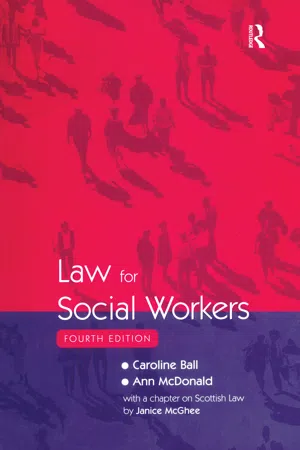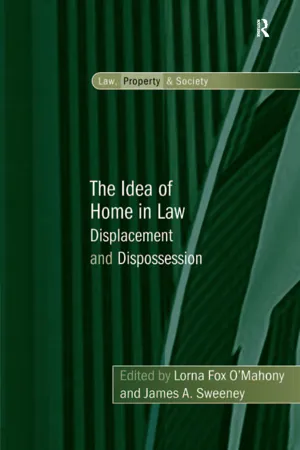Law
Housing Law
Housing law encompasses the legal regulations and protections related to housing, including landlord-tenant relationships, property rights, and housing discrimination. It governs issues such as eviction, rent control, habitability standards, and fair housing practices. Housing laws vary by jurisdiction and are designed to ensure safe, fair, and equitable housing for all individuals.
Written by Perlego with AI-assistance
Related key terms
3 Key excerpts on "Housing Law"
- eBook - ePub
- Caroline Ball, Ann McDonald(Authors)
- 2017(Publication Date)
- Routledge(Publisher)
Part VLegal Issues for ClientsPassage contains an image
Chapter 16 HousingModern Housing Law is about the right of an occupier not to be unreasonably deprived of his/her home and only to pay a fair rent for it, the efforts of landlords to let out their property at the greatest profit and yet retain the greatest freedom of disposal of it, and the rules of law which determine the rights and wrongs of a particular situation and interprets the application of statute law to particular arrangements.It is often confusing to a layperson that, technically, the law is still concerned with the land on which buildings stand rather than the houses, flats, garages or factories which are the subject of the vendor or purchaser’s interest.Housing Law is a vast and complex subject about which few social workers have or need detailed knowledge, but there are three topics about which social workers need sufficient knowledge to advise their clients or help them to get appropriate advice. These are:- eviction;
- unlawful eviction and harassment; and
- homelessness (Housing Act 1996, Part VII).
Following a brief introduction to the different relationships that may exist between individuals and the ‘land’ (including any building on that land) that they occupy to set them in context, these topics will be looked at in more detail.An individual may:- own the land – as a freehold owner; or
- have exclusive use of the land for a slice of time in return for payment or services, as tenant; or
- have permission to be on the land as a licensee without having a tenancy (as are guests in hotels, students in college, residents in homes, patients in hospital and so on); or
- be on the land without permission as a trespasser.
The occupier’s rights and duties are determined by his/her relationship to the land. In particular, the distinction between a tenant and a licensee - Padraic Kenna(Author)
- 2016(Publication Date)
- Routledge(Publisher)
Housing Law, Rights and Policy (Dublin, Clarus Press 2011) Ch. 8.3 Although the UN – Habitat Reports – UN-Habitat UNHRP Report Series, No 3, National Housing Rights Legislation (3rd edn) (HS/638/01E) (UNHRP, Nairobi, 2006); UN-Habitat UNHRP Report Series, No 1, Housing Rights Legislation: Review of International and National Legal Instruments (HS/638/01E) (UNHRP, Nairobi, 2002) provide an overview many new constitutions have emerged since that research was undertaken.At the international level, housing rights are embedded in the Universal Declaration of Human Rights4 at Article 25(1) and in the International Covenant on Economic, Social and Cultural Rights (ICESCR) at Article 11(1).5 In the European context, housing provisions are anchored in the Council of Europe’s European Social Charter (ESC) (Part I, principle 31), Articles 15(3), 16, 19(4), 30 and 31 (1961, revised 1996).6 Article 13 of the European Convention on the Legal Status of Migrant Workers (1977) also provides for housing rights for this particular social group7 . In addition, some rights established under the European Convention on Human Rights and Fundamental Freedoms (ECHR) (1950) have indirect implications for housing rights.84- eBook - ePub
The Idea of Home in Law
Displacement and Dispossession
- Lorna Fox O'Mahony, James A. Sweeney(Authors)
- 2016(Publication Date)
- Routledge(Publisher)
16 In this regard it could probably be said that the law regarding eviction has recently been developed or reformed more or less successfully under the influence of human rights and constitutional law, to a point where arbitrary and grossly unfair evictions are largely prohibited or restrained; where all occupiers of residential property enjoy a certain minimum of procedural protection against eviction; and where tenants and some other lawful occupiers cannot be evicted before the legal basis of their occupation has been terminated lawfully and fairly. In addition, eviction can in certain exceptional cases be prevented permanently or postponed temporarily, regardless of the legality of the occupation and the relative rights of the parties, purely because of justice considerations related to the social and economic context or the personal circumstances of the occupiers.Moral, social and doctrinal justifications for these reforms of eviction law have been proposed and discussed over the last few decades. However, my goal in this article is not to discuss the development of eviction law under the influence of human rights instruments and standards, important and fascinating as that subject is.17 For the present, I will simply take it as given that substantial progress has been made in this area and that eviction from residential property is now significantly restrained by constitutional and statutory conditions and requirements. Instead, I wish to focus on instances where residential occupiers are evicted specifically by the state18 and where the state justifies the eviction of individuals and communities from residential property with an appeal to supposedly stronger or more urgent state interests, in a way that might in the long run indirectly undermine the progress that has been made in statutory law regarding eviction of tenants and unlawful occupiers or squatters. From this perspective, the state sometimes relies on and makes use of legislation and common law – and even constitutional and human rights law – not to regulate and impose controls upon eviction, but to reach exactly the opposite effect, namely to facilitate eviction in cases where it is in the interests of the state to vacate (specifically residential)19 premises regardless of the socio-economic context, the personal circumstances of the occupiers or the effect that eviction may have on the occupiers. More specifically, I am interested in instances where the state uses its powers (either of expropriation or of land use regulation) to evict (lawful or unlawful) residential occupiers of land in order to clear the land for purposes of economic development or more beneficial use.20
Learn about this page
Index pages curate the most relevant extracts from our library of academic textbooks. They’ve been created using an in-house natural language model (NLM), each adding context and meaning to key research topics.


